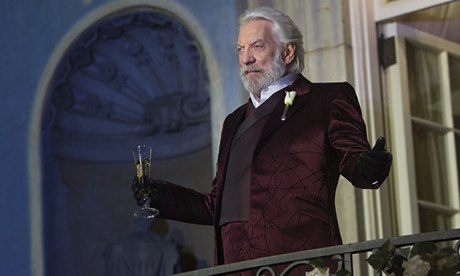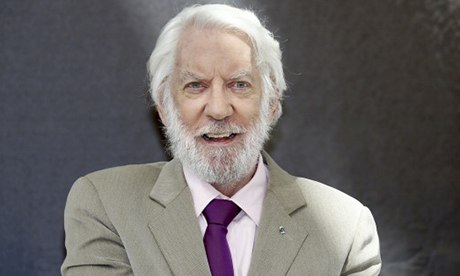Rory Carroll
The Guardian
November 29, 2013

Donald Sutherland wants to stir revolt. A real revolt. A youth-led uprising against injustice that will overturn the US as we know it and usher in a kinder, better way. “I hope that they will take action because it’s getting drastic in this country.” Drone strikes. Corporate tax dodging. Racism. The Keystone oil pipeline. Denying food stamps to “starving Americans”. It’s all going to pot. “It’s not right. It’s not right.”
Millennials need awakening from slumber. “You know the young people of this society have not moved in the last 30 years.” With the exception of Occupy, a minority movement, passivity reigns. “They have been consumed with telephones.” The voice hardens. “Tweeting.”
We are high up in a Four Seasons hotel overlooking Beverly Hills, sunlight glinting off mansions and boutiques below, an unlikely cradle of revolution. Sutherland, resplendent in a dark suit and red tie, is pushing 80. But he is quite serious about the call to arms. “We did it in ’68.”
The Canadian actor has a venerable record of leftwing activism dating back to support for the Black Panthers and opposition to the Vietnam war, but this latest foray into subversion dovetails with promoting The Hunger Games: Catching Fire, the second instalment in a series of four films based on Suzanne Collins’s bestselling novels for young adults. It takes forward the story of Katniss, played by Jennifer Lawrence, who must fight other oppressed proles to the death as part of a tyrannical government’s strategy of rule through fear. The dystopia, called Panem, is built on the ashes of the US, and Sutherland wants young audiences to respond to the allegory. “Hopefully they will see this film and the next film and the next film and then maybe organise. Stand up.”
It is a neat marketing pitch: go see the movie not to swell a Hollywood blockbuster’s box office but to fan a flame that will make the world a better place. Few stars could get away with that spiel, probably not even fellow liberal contemporaries such as Warren Beatty or Robert Redford. Sutherland, however, manages to sound sincere, even when insisting Hunger Games is not really a franchise since it’s based on a literary trilogy. It helps that he exudes charm and happily careens off-topic into eclectic anecdotes and observations: how the Guardian made him money, the night he ripped off a toenail on stage, the secret of a happy marriage and how some people are beyond redemption. Oh, and James Joyce, farting and masturbation. First, though, politics. In Hunger Games, Sutherland plays President Coriolanus Snow, a tyrant’s tyrant, with basilisk malevolence. Perched now on a sofa, long legs folded (he is 6ft 4in), the white mane just as magnificent as on screen, he is almost as intense when declaiming the films’ insurrectionary potential.

His own generation’s rebelliousness lapsed into bumper sticker slogans and today’s young are too fretful about finding jobs to change society, he laments. “I just think they’re not organised. It’s not something that’s happening in the universities, which is normally the breeding ground for that kind of activity.” Does he despair of the young? The famous drooping, pale blue eyes widen. “No, no, no. Otherwise there would be no point making this film. I have great hope and faith in them. I know because I talk to my children.” Which is just as well, because Hunger Games has made the 78-year-old something of a pin-up to a new generation unfamiliar with The Dirty Dozen, Kelly’s Heroes, Klute, Don’t Look Now or MASH, films that made him a star to their parents.
The Hunger Games, Sutherland suggests, is a coded commentary on inequality, power and hope. “It just puts things out in the light and lets you have a look at it. And if you take from it what I hope you will take from it, it will make you think a little more pungently about the political environment you live in and not be complacent.”
Four films spread over as many years can have a cumulative impact, he says. Young people may not revolt, he concedes, but they may effect profound change. “They might create a third party. They might change the electoral process, they might be able to take over the government, change the tax system.”
Sutherland’s belief in the power of film stems from a double-bill he watched in Toronto in 1954, aged 19: a state of bliss cast by Federico Fellini’s La Strada dissolved by Stanley Kubrick’s first world war drama Paths of Glory. “When I came out of that movie I was grabbing stones, pieces of gravel, anything, and throwing them at the street, so much was the rage at the injustice that I felt.”
One reason The Hunger Games has been so successful – the first film, directed by Gary Ross, made nearly three quarters of a billion dollars at the global box office – is that the allegory can be read multiple ways. A critique, for instance, of central government trampling states’ rights. Sutherland instead sees a critique of Tea Party-led excesses but he does note a parallel between his character and Barack Obama, whom he supports. “I think he realises, like Coriolanus Snow realises, that to exert authority and to control a situation it is necessary to make certain expedient decisions that you would not normally make. I don’t think it’s in his nature to send Predator drones. I thought it was in his nature to get out of Guantánamo, but people prevented that. It’s not been easy for him to govern, because this is a very racist society.”
